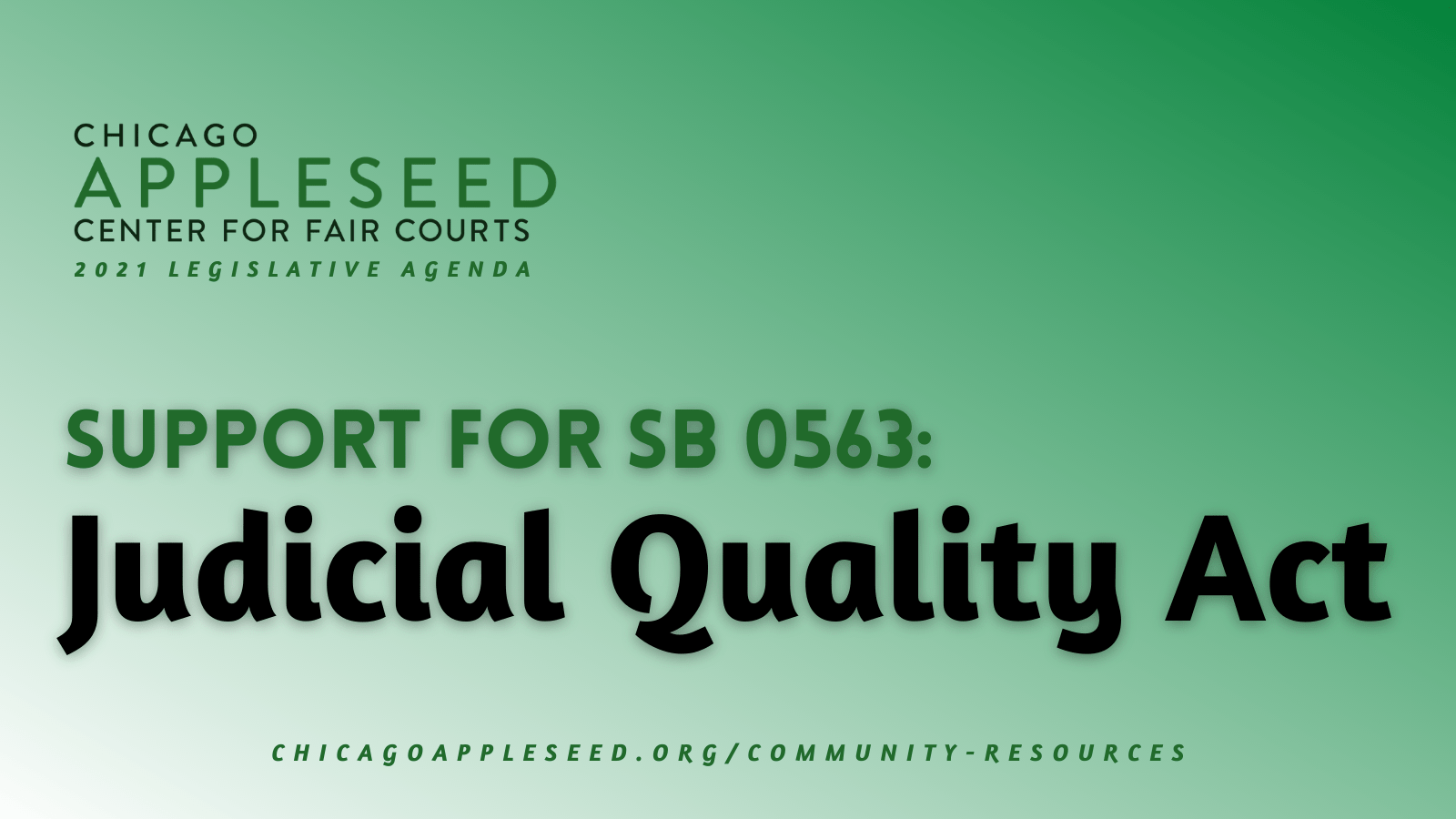Support for SB 0563: The Judicial Quality Act
Published: March 31, 2021
Chicago Appleseed Center for Fair Courts urges legislators to pass the Judicial Quality Act (SB 0563). The Act, sponsored by Senators Aquino and Hunter, mandates the “develop[ment] and implement[ation]” of “an ongoing education and training program for judges and relevant court personnel” that focuses on bias-prone topics, including “domestic violence or intimate partner violence, child abuse, racial bias in sentencing, cultural competency, transgender and gender nonconforming, and the impact of trauma on youth brain development.” Currently, the training requirement for Illinois judges totals 30 hours every two years and covers a myriad of topics; the Judicial Quality Act is a major step in creating a more fair and unbiased Illinois court system, where judges have access to the most up-to-date evidence-based, anti-racist best practices and procedural justice training.
Extensive evidence shows the existence of implicit bias, in which unconscious thoughts and stereotypes lead to purposeful or automatic discriminatory actions, and how it can affect judicial decision-making. Studies continually show that “much of human cognition can and does occur without introspective access,” and that there is substantial “evidence that implicit attitudes produce discriminatory behavior.” Legal scholars like Jeffrey Rachlinski have concluded that judges are not immune to implicit bias, with research showing that “judges, like the rest of us, carry implicit biases” and that “these implicit biases can affect judges’ judgment.”
The first step to address the discriminatory effects of unconscious biases is equally well documented: make the implicit explicit through ongoing training and anti-racist, anti-sexist education.
Psychologist Dr. Patricia Devine notes that the effects of implicit biases are reduced when one is “aware of one’s implicit bias” and “learn[s] to replace…biased response[s] with non-prejudiced responses.” Similarly, Rachlinski’s research confirms that education reduces the effects of implicit bias, as he found that “when judges are aware of the need to monitor their own responses for the influence of implicit…bias, and are motivated to suppress that bias, they appear to be able to do so.”
All participants in the legal system must actively work to address the unwarranted assumptions that they, like all people, harbor. Implicit biases form and operate in subtle and insidious ways – they are the product of personal experience and social learning – but with ongoing anti-racist and anti-sexist education, these biases can be addressed. The Judicial Quality Act is a great first step.
The Judicial Quality Act translates years of scientific research on the effects of overt racism, sexism, and ableism in the courts, and the pervasiveness of implicit biases, into a policy that will significantly improve the Illinois’ judiciary’s access to evidence-based training. By emphasizing topics that are most prone to racial, sexual, gender, ageist, and other biases, this act provides an opportunity for Illinois judges to confront the biases they may not be consciously aware of in order to better deliver justice.
As our nation remains stunned and appalled by the recent murders of Asian American women in Georgia, the consistent police murders of unarmed Black youth, like Laquan McDonald, and the Chicago Police Department’s raid on the home of Anjanette Young, we can no longer deny that the perverse effects of biases, prejudices, and cultural misunderstandings are prevalent in and disastrous to our institutions. We must take action to counter these corrosive influences threatening the integrity of our entire legal system.
The Illinois legislature has the opportunity to make further reforms to our criminal and civil legal system by helping curb the effects of implicit biases on Illinois’ judiciary. The Judicial Quality Act not only helps judges identify the subconscious prejudices they may hold, but also educates judges on how to prevent those implicit assumptions from unjustly affecting the Illinoisans they serve.
Chicago Appleseed Center for Fair Courts strongly urges the passage of the SB 0563: the Judicial Quality Act. We hope the Illinois Supreme Court and all other stakeholders will join our active support.
Contributor: Elijah Gelman is an undergraduate intern with Chicago Appleseed Center for Fair Courts and a fourth-year History major at Northwestern University with a background in philosophy.

